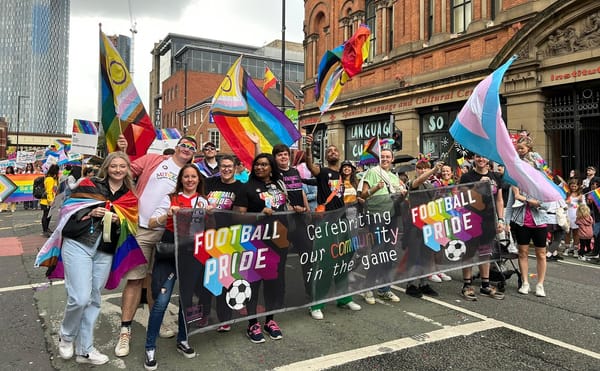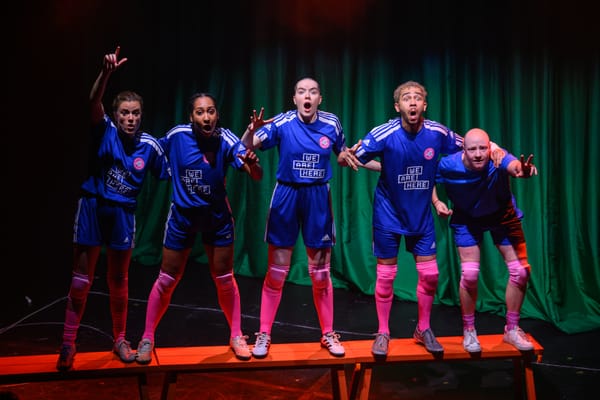Why is homophobic abuse commonplace in football?
An exploration of the nature of homophobic abuse in men's football.
There’s a misconception that LGBTQ+ people just don’t like sport. I don’t believe that. I think that a heteronormative society puts up barriers to queer people to block them from liking sport. That includes football.
Each barrier is nuanced and complex. Each needs to be understood if we’re ever going to change the game.
One such barrier is the homophobic chanting – and generalised homophobic abuse – you can hear every week at football grounds across the country. So over the last few weeks, I’ve spent some time thinking about the nature of this abuse, focussing particularly on homophobia on the terraces at professional men’s football games.
This is my exploration of the nature of homophobic abuse: what it looks like, how it works, and its effects.
Years ago, when Kevin produced a podcast about homophobia in football after then-Burnley striker Andre Gray’s historic homophobic tweets, he didn’t really expect it to almost kill his relationship with his club.
“All I said was that there needed to be a public stance that homophobia was not okay. The abuse I got back — well, you can imagine football fans, Burnley fans. It made me feel disconnected from the club.
“And when I interviewed the CEO and chairman about it, they were very dismissive. In fact, they spent more time talking about how upset Andre Gray was and basically said we needed to shut up about because it was upsetting him rather than anything else.”
“It’s not a coincidence that I probably went to about two Burnley games in two years after that. I’ve hardly been back at all.”
The incident was back in 2016.
Today, it seems like homophobic chanting is hitting headlines almost every week.
Research that took place in 2020 found 95% of fans would accept a gay player on their team, yet the same study showed “41% have heard language they interpret as malicious or toxic, while 37% believe it is not intentionally hostile”. The study points out the inherent contradiction in this. 95% fans clearly are, deep down, accepting people, but 37% of people can find reasons to explain away homophobia.
This only goes to show how complex homophobic abuse in football is.
Football has its own language. It seems to have its own rules about what’s permissible. These rules are borne partly out of masculinity and partly out of a desire to create an environment that helps win games for their team.
Behaviour at football stadiums is performative – people want to seem like a certain type of person to their peers, so they adapt their language accordingly — to be more masculine, to be more aggressive.
This performativity was key, I think, to the brush with homophobic chanting I once had at a football match.
I wrote about the ringleader’s behaviour in this newsletter previously:
Occasionally, the ringleader would pipe up and try to get his merry little band going again but he’d struggle. They would start up when I faced the pitch and stop as soon as I turned back around, like a toddler hurling his food around as soon as his parents’ back was turned.
This, in essence, was the ringleader performing, seeking validation by looking around to his mates. He was acting as he thought others wanted him to act. And his friends joined in, acting as they thought their ring leader would want them to act.
Now, I have no doubt that the ringleader acted homophobically. But his mates? Maybe they were just wanting to play the part. They just didn’t stop to think why they were saying such horrendous things.
Yes, technically they too were homophobic but is it useful to distil this issue down to such binary terms? No one is helped by such a reductive debate.
Those joining in with homophobic abuse and chanting should still be condemned – without strong enforcement, there is no way we’ll ever change the culture. But to treat the sheep the same as the real villains – the ring leaders – doesn’t actually help solve the problem.
The second reason for the suspension of social norms is the idea that as a fan, it’s your job to make the environment as hostile as possible for the opposition team. It’s on you to put them off however you can. Research, again, backs this up.
This is where societal norms and historical stereotypes come in. Traditionally, to be gay has been to be weak, in sporting terms. Homosexuality identity is associated with femininity, and femininity too has historically been unjustifiably synonymous with physical weakness.
So when you go to a football match, as a traditional male fan at a men’s football game, to shout homophobic abuse at opposition players is, first and foremost, a way of putting doubt in a player’s mind. It’s just seen as another way of saying “hey, you! You’re weak. You’re gonna mess up.”
Of course, this is total bollocks.
It’s so obvious it barely needs saying, but we LGBTQ+ people are among the most marginalised communities in our society. As such, we are also among the bravest in our society – sometimes overcoming immense barriers to succeed. So we’re certainly not weak.
But this absurd notion that to be gay is to be weak prevails. And until we tackle it, fans will continue to use it as a stick to beat opposition players with. To gain an advantage, to do their bit.
This underlines the scale of the task ahead. You’d be correct to notice how deep-rooted this stuff is. There are layers and layers of societal normalisation of homophobic tropes and stereotypes that need to be systematically unpicked if we are to solve the issue of homophobia in football.
I’ve heard it said that football just mirrors society. That football doesn’t cause homophobic abuse, society does. Now, this may be true, but it doesn’t absolve football – and football fans – of the need to tackle the problem.
That football brings society’s prejudices to the surface in a way that little else does, I think places more of a burden on the game to play its part in fixing the problem.
Regardless of any nuanced reasoning behind why homophobic abuse happens in football, the effect is the same. Queer people feel excluded, threatened and alienated. And those feelings seep from one individual out into the community as a whole, creating a fear – a resentment even – of football. So many don’t ever engage, refusing to go near something that might hurt you just as you’d probably steer clear of a grizzly bear on a hiking trail.
So yes, we should try to understand the complexities of homophobia in football, but we should not use that understanding as any justification for it. We should use it instead to crack on, change society, and change football for the better.



